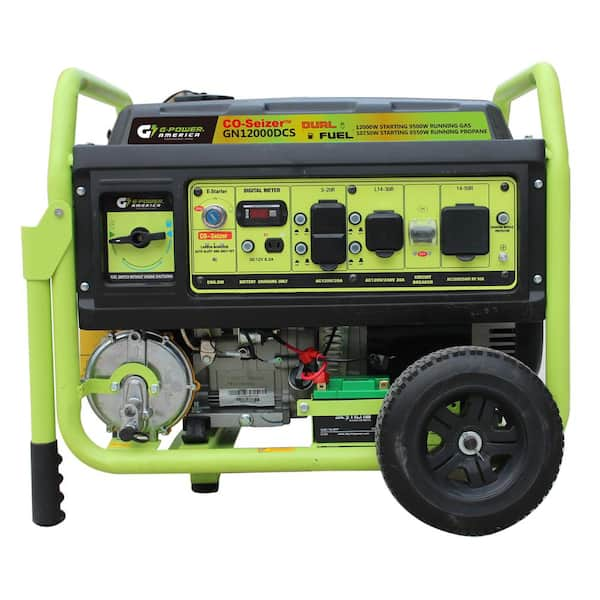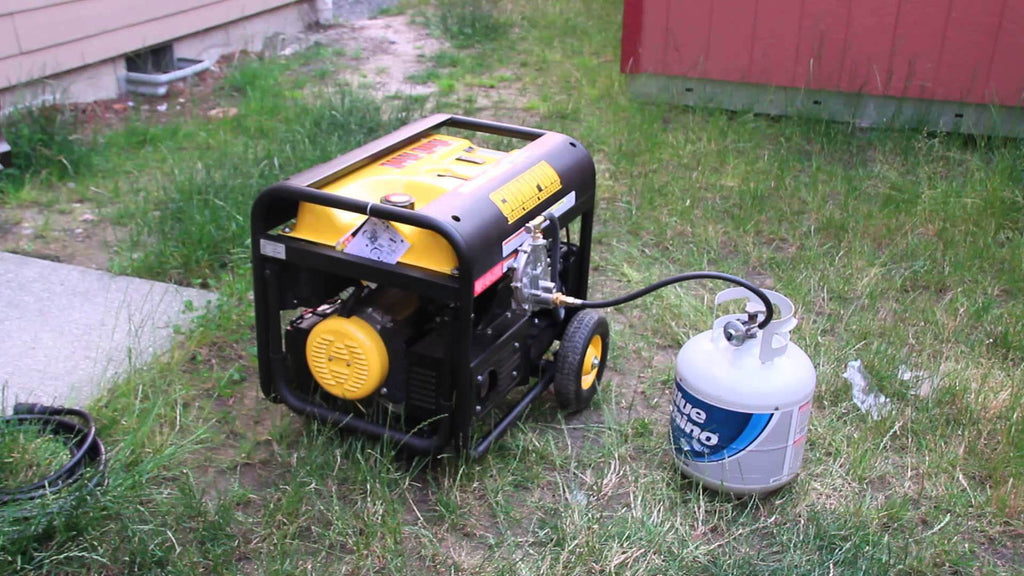Disclosure: This post contains affiliate links and I will be compensated if you make a purchase after clicking through my links. Learn More
Gas generators are generally cheaper to run than propane generators. Gasoline is more readily available and often costs less.
Choosing the right generator depends on various factors, including cost, efficiency, and availability of fuel. Gas generators typically have lower fuel costs and higher energy output, making them a popular choice for many users. Propane generators, on the other hand, offer cleaner burning fuel and longer shelf life.
When comparing a gas vs propane generator, each option has unique benefits suited to different priorities.
They are ideal for those who prioritize environmental impact and long-term storage. Each type of generator has its own advantages and disadvantages, and the best choice depends on your specific needs and circumstances. Understanding these differences can help you make an informed decision that balances cost, efficiency, and sustainability.
Introduction To Generators
Generators are essential for providing power during outages. They ensure that homes and businesses run smoothly. Choosing the right generator can be tricky. It’s important to consider costs and efficiency.
Most Common Types Of Generators
There are different types of generators available. Each type has its pros and cons. These three are most common.
- Gas Generators: These are common and easy to find. They run on gasoline.
- Propane Generators: These use propane as fuel. They are known for being cleaner.
- Diesel Generators: Diesel generators are powerful and durable. They are ideal for heavy-duty use.
Key Differences Between Gas and Propane Generators
| Aspect | Gas Generator | Propane Generator |
|---|---|---|
| Fuel Cost | Generally cheaper upfront | Can be costlier but more stable |
| Efficiency | Less efficient, higher consumption | More efficient, lower consumption |
| Maintenance | Requires frequent refueling | Longer shelf life, less frequent refueling |
Choosing the right generator impacts your wallet and the environment. Consider both initial and long-term costs.
What Are Gas Generators
Gas generators are popular for providing backup power. They use gasoline to generate electricity. People use them during power outages or in remote locations. Let’s dive into how they work and their pros and cons.
How Gas Generators Work
Gas generators convert gasoline into electrical power. They have an internal combustion engine. When the engine runs, it turns a generator. The generator then produces electricity. It’s a simple process but very effective. You just need to fill the tank with gasoline. Then, start the engine, and power flows to your appliances.
Pros And Cons of Gas Generators
Pros:
- Easy to find fuel: Gasoline is widely available.
- Portable: Many gas generators are easy to move.
- Initial cost: Often cheaper than other types.
Cons:
- Noisy: Can be very loud during operation.
- Fuel storage: Gasoline is flammable and needs safe storage.
- Short shelf life: Gasoline can go bad over time.
Gas generators have their advantages and disadvantages. They are easy to fuel and portable but can be noisy and require careful fuel storage. Each point is important to consider before making a purchase.
What Are Propane Generators
Propane generators are a popular choice for backup power. They offer reliable performance and clean energy. But how do they compare to gas generators in terms of cost? Let’s dive into how propane generators work and their pros and cons.
How Propane Generators Work
Propane generators use liquid propane as fuel. This fuel is stored in a tank. The generator converts the liquid propane into gas. The gas is then burned to create electricity. Propane generators start quickly and run smoothly.
Pros And Cons of Propane Generators
Pros:
- Long Shelf Life: Propane can be stored for a long time without degrading.
- Clean Burning: Propane produces fewer emissions than gasoline.
- Easy Storage: Propane tanks are easy to store and transport.
Cons:
- Initial Cost: Propane generators can be more expensive to buy.
- Fuel Availability: Propane might not be available everywhere.
- Efficiency: Propane generators can be less efficient than gas ones.
Comparing Gas vs Propane Generators on Different factors:
| Factor | Gas Generator | Propane Generator |
|---|---|---|
| Fuel Cost | Generally cheaper | Varies by location |
| Storage Life | Up to 1 year | Indefinite |
| Emissions | Higher | Lower |
| Initial Cost | Lower | Higher |
Fuel Costs
When deciding between a gas or propane generator, understanding fuel costs is crucial. This section will explore the price differences between gasoline and propane.
Gasoline Prices
Gasoline prices fluctuate regularly. The cost depends on several factors:
- Location
- Season
- Market demand
Gasoline is often more expensive in summer. Demand goes up during travel seasons. You can track gasoline prices using apps or websites.
Propane Prices
Propane prices are generally more stable than gasoline. Factors that affect propane prices include:
- Supply
- Weather
- Storage costs
Propane is often cheaper per gallon than gasoline. It can be stored for longer periods. Propane also burns cleaner, which can save on maintenance costs.
Below is a comparison table of average prices:
| Fuel Type | Average Price per Gallon |
|---|---|
| Gasoline | $3.00 |
| Propane | $2.50 |
Choosing the right fuel can save you money. Consider the stability and storage of the fuel.
Maintenance Costs
Understanding the maintenance costs of gas and propane generators is crucial. Regular upkeep ensures your generator runs efficiently. Let’s dive into the specifics.
Gas Generator Maintenance
Gas generators require frequent checks. Gasoline can degrade over time, causing clogging. Regularly inspect fuel lines, filters, and carburetors. Change the oil every 50-60 hours of use. Spark plugs need replacement every year. Here’s a quick look:
| Component | Maintenance Frequency |
|---|---|
| Fuel Lines | Monthly |
| Filters | Every 3 months |
| Carburetor | Every 6 months |
| Oil Change | Every 50-60 hours |
| Spark Plugs | Annually |
Propane Generator Maintenance
Propane generators are easier to maintain. Propane does not degrade like gasoline. This means fewer issues with clogging. Key maintenance tasks include:
- Check propane tank connections monthly.
- Inspect fuel lines quarterly.
- Change the oil every 100 hours of use.
- Replace spark plugs every two years.
Here’s a summary of maintenance:
| Component | Maintenance Frequency |
|---|---|
| Propane Tank Connections | Monthly |
| Fuel Lines | Quarterly |
| Oil Change | Every 100 hours |
| Spark Plugs | Every 2 years |
Overall, propane generators require less frequent maintenance. This can save time and money in the long run.

Efficiency And Performance
Understanding the efficiency and performance of gas and propane generators is crucial. It helps determine which option is more cost-effective for your needs. This section delves into fuel efficiency and power output to compare the two generator types.
Fuel Efficiency
Fuel efficiency is a key factor in determining running costs. Propane generators are generally more fuel-efficient than gas generators. Propane has a longer shelf life and burns cleaner, leading to less waste.
- Propane Generators: These can run up to 12 hours on a 20-pound tank.
- Gas Generators: Typically, they consume more fuel and have shorter run times.
Propane’s efficiency can save you money over time. Gasoline, while more readily available, tends to be less efficient.
Power Output
Power output is another important factor in generator performance. Gas generators generally produce more power compared to propane generators. This higher power output can be beneficial for heavy-duty applications.
| Generator Type | Average Power Output |
|---|---|
| Gas Generator | 5000 – 7000 watts |
| Propane Generator | 4000 – 6000 watts |
Gas generators are typically more powerful, but propane generators are more efficient. Choosing the right generator depends on your power needs and usage patterns.
Environmental Impact
Choosing between a gas and a propane generator involves considering environmental impact. Both fuels have different effects on the environment.
Gas Emissions
Gas generators burn gasoline to produce electricity. This process releases various pollutants into the air.
- Carbon Monoxide (CO): A harmful gas that can affect air quality.
- Nitrogen Oxides (NOx): Contributes to smog and acid rain.
- Carbon Dioxide (CO2): A greenhouse gas that affects climate change.
Gasoline contains impurities. These impurities can lead to more emissions. Gas generators also tend to be noisier, which can affect noise pollution.
Propane Emissions
Propane generators are generally cleaner than gas generators. They produce fewer harmful emissions.
| Emission Type | Gas Generator | Propane Generator |
|---|---|---|
| Carbon Monoxide (CO) | High | Low |
| Nitrogen Oxides (NOx) | Moderate | Low |
| Carbon Dioxide (CO2) | High | Moderate |
Propane burns more cleanly, reducing harmful emissions. It also doesn’t contain impurities like gasoline.
Additionally, propane is stored in sealed tanks. This reduces the risk of spills and leaks.
Choosing the Right Generator: Gas vs. Propane
Selecting the best generator for your needs often comes down to a few key factors: budget, frequency of use, and environmental impact. Here’s how to decide between gas and propane generators based on these needs.
Budget Considerations
Gas generators are generally cheaper upfront, and gasoline is often less expensive than propane. However, fuel prices can vary, so consider your long-term costs based on how frequently you’ll use the generator. If affordability is your priority, a gas generator might be your best choice.
Usage Frequency
Think about how often you’ll use the generator. For emergency situations, a propane generator is ideal since propane has a longer shelf life, meaning you don’t need to worry about fuel going bad. For regular use or daily power needs, gas generators are popular because gasoline is widely available and offers more power output for continuous use.
Environmental Priorities
If reducing emissions and using cleaner fuel is important to you, propane is the better choice. Propane burns cleaner than gasoline, producing fewer pollutants and a lower carbon footprint. For anyone concerned about environmental impact, propane generators are a more eco-friendly option.
Each generator type has its strengths. By considering these practical points, you’ll be better equipped to choose the right one for your specific needs.

Frequently Asked Questions
Which Is Cheaper, Gas Or Propane Generator?
Propane costs less per hour of generator run time compared to gas. A gallon of propane lasts longer than a gallon of gas. Since propane burns cleaner, you’ll spend less on engine repairs and maintenance. Many users save $200-300 per year by switching from gas to propane generators.
How Efficient Are Propane Generators?
Propane generators use about 2-3 pounds of fuel per hour at half load. They start easily in cold weather and run smoothly without the fuel problems that gas generators face. Your propane generator will keep working steadily even after sitting unused for months, unlike gas engines.
Can Propane Generators Save Money?
You’ll save money with propane in several ways. Propane fuel stays fresh forever, so you won’t waste money replacing old gas. Propane causes less engine wear, cutting repair costs. Most propane generators need oil changes half as often as gas models. The fuel is cheaper per running hour.
Is Propane Cleaner Than Gas?
Propane creates 60% less carbon than gas when burned. It won’t spill or leave sticky deposits in your generator’s engine. Your generator’s oil stays cleaner longer with propane. There’s no smoke or strong smell when running a propane generator, making it better for camping and home backup.
Final Words
Choosing between a gas and propane generator depends on your needs. Gas is often cheaper but less efficient. Propane costs more but stores longer. Consider fuel availability and storage. Both have pros and cons. Make an informed decision based on your specific requirements.


